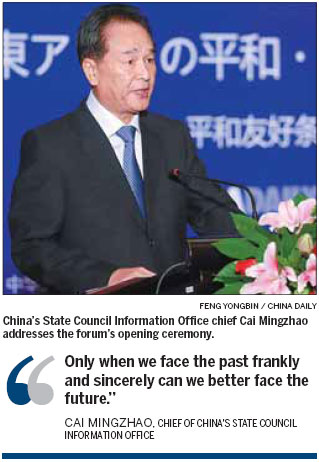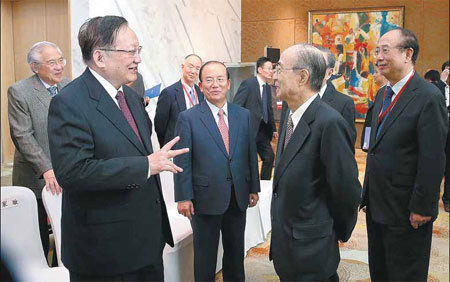Aiming for the win-win
Updated: 2013-10-27 08:08
By Zhao Huanxin(China Daily)
|
|||||||||
Both nations can move forward to seek common ground and overcome differences, Beijing-Tokyo Forum participants say
Conflict and disparity between China and Japan must be brought under effective management not only for the benefit of the two countries, but also for the future of Asia and the world, participants to a key forum said on Saturday.
"It is not so horrific that there exists disparity between us; the key is whether we can move forward to seek common ground while shelving differences," said Tang Jiaxuan, former State councilor and veteran diplomat. He is also head of the China-Japan Friendship Association.
Addressing the Ninth Beijing-Tokyo Forum, Tang said he believed mainstream opinion in both China and Japan favor the proper handling of current conflicts and early solutions toward improved bilateral relations.
An annual poll by the Japanese nonprofit organization Genron NPO and China Daily - the forum's sponsors - shows mutual goodwill has dipped to a record low in the past decade. The survey found the impasse between Beijing and Tokyo over the Diaoyu Islands had fomented aversion between the Chinese and Japanese, with 90 percent expressing negative opinions about the other nation.
However, more than 70 percent of those surveyed also acknowledged that bilateral relations are "important".
In trying to reverse the trend, rational voices among citizens should not be neglected, Tang said, adding that poll results indicated the majority in both nations prefer peace and cooperation to war and confrontation.
He noted there had been longstanding differences and even confrontation between China and the former Soviet Union, but Beijing and Moscow have overcome those difficulties to forge a comprehensive strategic partnership.
China also has different viewpoints from the United States, but - guided by enlightened leaders - the two countries are taking solid steps toward building a new level of relationships between major world powers, he said.
It is the same with India. Beijing and New Delhi have managed their border disputes with effective checks and balances to achieve long-term peace and security.
It was because the older generations of Chinese and Japanese leadership had sought common ground while setting aside old injuries that the two countries could normalize diplomatic relations and sign a peace treaty in the 1970s, Tang said, even amid extremely difficult environments.
For current relations to improve, Tang said, the Japanese side need to address two key questions.
First, Japan has to decide if it views China as a rival or a partner and if China's development is an opportunity or a threat.
Currently, the talk in Japan is more about the "China threat" than the "China opportunity". And Japanese media reports seem to characterize the domestic and foreign policies of Japanese Prime Minister Shinzo Abe as attempts to guard against and contain China, Tang said.
If the "China threat" rhetoric is for a political agenda, it could get very dangerous.
Japan should also decide if it serves the development of East Asia or is part of the strategy of powers outside the region.
"We hope Japan genuinely sees itself as a member of Asia, realizes its responsibility to revitalize the region, properly handles relations with its neighbors and plays a constructive role in maintaining regional peace and stability while promoting economic integration within the area," Tang said.
Tang reminded both countries to review and reconfirm the spirit of the four important political documents between China and Japan so as to keep bilateral relations headed in the right direction.
The only correct path is to adhere to the way of peace, friendship, cooperation, mutual benefit and "win-win" principles.
The four documents Tang referred to include the China-Japan Joint Statement inked in 1972; the China-Japan Treaty of Peace and Friendship of 1978; the China-Japan Joint Declaration of 1998; and a joint statement on advancing strategic and mutually beneficial relations signed in 2008, Xinhua News Agency reported.
Cai Mingzhao, chief of China's State Council Information Office, said the status quo of Sino-Japanese relations 41 years after the normalization of diplomatic relations had failed to meet expectations.
"Only when we face the past frankly and sincerely can we better face the future," Cai said.
He said a large Japanese business delegation will visit China in November. It follows a visit to Japan by a group of Chinese entrepreneurs last month.
Cai said he also expected media in both countries to better promote understanding between China and Japan, as well as help improve the long-term development of bilateral relations.
Masato Kitera, Japan's ambassador to China, said he was concerned about the deteriorating feelings among nationals of the two countries. For them to become true friends, it is vital to have direct dialogue and exchange at various levels, he said.
The ambassador said that, for a brighter future in Asia and the world, the opportunities for Japan and China to work together are as numerous as the stars.
"What we should do is not to emphasize the disparities too much but to move forward from the consensus that the leaders have reached, to strive together for better prospects in Asia and the world," he told the forum.
The ambassador said that, in the four decades since China and Japan normalized diplomatic relations, a quarter of students of Japanese as a foreign language are Chinese, while there are 353 pairs of "sister cities" between the neighbors.
"Japan-China relations, built upon the unremitting efforts of our forerunners, are so profound and deep that I firmly believe they will not be easily destroyed. I will contribute my effort toward making it deeper and more extensive," he said.
Noting that 2013 marks the 35th anniversary of the signing of the China-Japan Peace and Friendship Treaty, former United Nations undersecretary-general Akashi Yasushi said the treaty is an antiwar pledge made by the two countries, under which they agree to resolve all their disputes by peaceful means.
China and Japan should set up a crisis management system, he said, adding that the Beijing-Tokyo Forum is an important opportunity to bring derailed relations "back on a normal track".
Zhao Qizheng, chairman of the foreign affairs committee of the 11th National Committee of the Chinese People's Political Consultative Conference, China's top political advisory body, said the forum gives testimony that people of insight have not given up efforts to improve relations.
The annual gathering enables participants to express themselves and strengthen understanding, said Zhao, who is also president of the Journalism School of Renmin University of China in Beijing.
Miyamoto Yuji, former ambassador to China, said the focus of global economic development has shifted to East Asia, and China and Japan are the focal points. Should relations sour and the economies consequentially stagnate, the whole region's economic growth will also fail.
"Relations between China and Japan are not only important to themselves but also important to the regional as well as the global economy," he said.
It is unwise to allow relations to be grounded because of "small things", he added.
JFE Steel Corp president Sudo Fumio said now is a good time to return to the "very beginning" of ties' normalization.
Xu Dunxin, former ambassador to Japan, said he believed the point of the "very beginning" lies in the principles and spirit enshrined in the important political statements and the China-Japan Treaty of Peace and Friendship.
Xu, a former vice-foreign minister, said the current problems between China and Japan could only be solved when the Japanese face up to history and admit there exist disputes over the Diaoyu Islands.
Lyu Zushan, vice-chairman of the Financial and Economic Committee of the National People's Congress, said the world's second- and third-largest economies have been instrumental in driving East Asia's economic stability and prosperity.
zhaohuanxin@chinadaily.com.cn
|
Former State councilor Tang Jiaxuan (left, front row); chairman of the foreign affairs committee of the 11th National Committee of the Chinese People's Political Consultative Conference Zhao Qizheng (right); and former UN undersecretary-general Akashi Yasushi (second from right, front row) talk before the Ninth Beijing-Tokyo Forum opens in Beijing on Saturday. Xu Jingxing / China Daily |

(China Daily 10/27/2013 page1)
